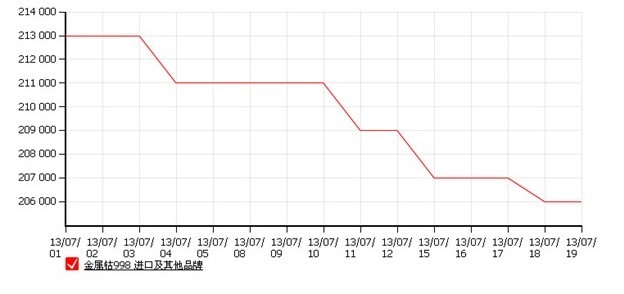Cobalt prices continued to decline this week, with MB high-grade cobalt closing at $13.6–15/lb and low-grade cobalt at $13.3–14.4/lb. As the Western summer break approaches, downstream industries have seen a significant drop in orders, leading to limited trading activity. Most traders are pushing for lower prices, but the number of inquiries remains low, and actual deals are scarce.
Domestically, metal cobalt has followed the global trend, with the average price falling by 3,000 yuan/ton this week. The mainstream market price is now around 203–209 yuan/kg, while imported cobalt transactions are even lower, averaging 201–202 yuan/kg. This week’s market conditions have been challenging, with reduced shipment volumes and a generally quiet off-season atmosphere.

The cobalt salt market has remained relatively stable this week. Cobalt chloride is trading between 5.3–5.5 million yuan/ton, while cobalt sulfate is priced around 4.4–4.7 million yuan/ton. Cash transactions are slightly weaker, reflecting softer demand in the short term.
With the lithium battery sector showing signs of slowing down, demand for raw materials has weakened. While cobalt oxide shipments remain acceptable, transaction difficulties have become more evident, especially at higher price points. Some manufacturers have slightly adjusted their prices downward, with the market price dropping as low as 170 yuan/kg, though the mainstream range remains around 172 yuan/kg.
Cobalt powder prices have remained stable at approximately 255 yuan/kg. However, demand from the hard alloy industry is weak, and shipment volumes are moderate, suggesting that prices could soften further in the coming weeks.
Earlier in July, there was excessive optimism about potential policy changes in the Democratic Republic of Congo, which led to some market overreaction. However, as these expectations faded, the price correction aligned with broader market realities. Looking ahead, both Glencore and Freeport are expected to reduce their cobalt supply in August, which could provide support once the market resumes active procurement. Overall, the cobalt market has shown a bearish trend throughout July, with traders cautiously watching for signs of recovery.
Piston and Rod Seals
Piston Seals and Rod Seals are important seals used in mechanical equipment. Their main function is to prevent liquid and gas leaks and ensure the normal operation of mechanical equipment. Piston seals and rod seals are usually used in hydraulic and Pressure system, such as hydraulic cylinders and Pneumatic cylinder. The quality and performance of these seals directly affect the efficiency and lifespan of mechanical equipment.
The classification of piston seals and rod seals is mainly based on their material and design structure. According to the different materials, they can be divided into rubber seals, polyurethane seals, polytetrafluoroethylene seals, metal seals, etc. According to the different design structures, they can be divided into unidirectional seals, bidirectional seals, rotary seals, etc.
Rubber seals are a common type of seal, and their main material is rubber. Rubber seals have good sealing performance and wear resistance, and are suitable for medium and low pressure hydraulic systems and Pressure system. Polyurethane sealing element is a high-performance sealing element, and its main material is polyurethane. Polyurethane seals have high wear resistance, high temperature performance and high pressure performance, and are suitable for high-pressure hydraulic systems and Pressure system. PTFE sealing element is a corrosion-resistant sealing element, and its main material is PTFE. PTFE seals have excellent corrosion resistance and high temperature resistance, making them suitable for fields such as chemical and food processing. Metal seals are a type of high-temperature and high-pressure seal, mainly made of metal. Metal seals have high temperature and high pressure performance and corrosion resistance, and are suitable for high temperature and high pressure hydraulic systems and Pressure system.
Unidirectional seals and bidirectional seals are classified based on different sealing directions. A unidirectional seal can only prevent the leakage of liquid or gas from one direction, while a bidirectional seal can prevent the leakage of liquid or gas from both directions. Rotating seal is a type of seal that can rotate and is mainly used for sealing rotating shafts. Rotary seals are divided into unidirectional rotary seals and bidirectional rotary seals.
Overall, piston seals and rod seals play a very important role in mechanical equipment. Choosing appropriate seals can improve the efficiency and lifespan of mechanical equipment, reduce maintenance costs and downtime. When selecting seals, it is necessary to comprehensively consider factors such as the working environment, pressure, and temperature of the mechanical equipment to choose a suitable seal.
Universal Piston and Rod Seals,Interchangeable Piston and Rod Seals,Versatile Piston and Rod Seals
DG Zhongxingshun Sealing Products Factory , https://www.zxs-seal.com
